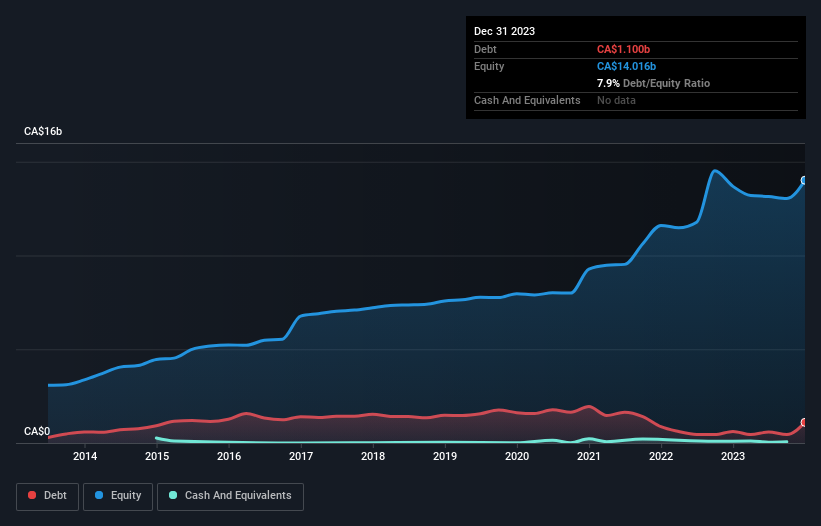Warren Buffett famously said, 'Volatility is far from synonymous with risk.' It's only natural to consider a company's balance sheet when you examine how risky it is, since debt is often involved when a business collapses. Importantly, Tourmaline Oil Corp. (TSE:TOU) does carry debt. But should shareholders be worried about its use of debt?
Why Does Debt Bring Risk?
Debt and other liabilities become risky for a business when it cannot easily fulfill those obligations, either with free cash flow or by raising capital at an attractive price. Part and parcel of capitalism is the process of 'creative destruction' where failed businesses are mercilessly liquidated by their bankers. However, a more common (but still painful) scenario is that it has to raise new equity capital at a low price, thus permanently diluting shareholders. Having said that, the most common situation is where a company manages its debt reasonably well - and to its own advantage. When we examine debt levels, we first consider both cash and debt levels, together.
Check out our latest analysis for Tourmaline Oil
What Is Tourmaline Oil's Net Debt?
As you can see below, at the end of December 2023, Tourmaline Oil had CA$1.10b of debt, up from CA$619.1m a year ago. Click the image for more detail. On the flip side, it has CA$70.0m in cash leading to net debt of about CA$1.03b.

How Strong Is Tourmaline Oil's Balance Sheet?
According to the last reported balance sheet, Tourmaline Oil had liabilities of CA$1.59b due within 12 months, and liabilities of CA$4.49b due beyond 12 months. On the other hand, it had cash of CA$70.0m and CA$731.1m worth of receivables due within a year. So its liabilities outweigh the sum of its cash and (near-term) receivables by CA$5.28b.
This deficit isn't so bad because Tourmaline Oil is worth a massive CA$23.7b, and thus could probably raise enough capital to shore up its balance sheet, if the need arose. However, it is still worthwhile taking a close look at its ability to pay off debt.
We use two main ratios to inform us about debt levels relative to earnings. The first is net debt divided by earnings before interest, tax, depreciation, and amortization (EBITDA), while the second is how many times its earnings before interest and tax (EBIT) covers its interest expense (or its interest cover, for short). Thus we consider debt relative to earnings both with and without depreciation and amortization expenses.
Tourmaline Oil's net debt is only 0.23 times its EBITDA. And its EBIT covers its interest expense a whopping 138 times over. So we're pretty relaxed about its super-conservative use of debt. On the other hand, Tourmaline Oil's EBIT dived 16%, over the last year. We think hat kind of performance, if repeated frequently, could well lead to difficulties for the stock. The balance sheet is clearly the area to focus on when you are analysing debt. But ultimately the future profitability of the business will decide if Tourmaline Oil can strengthen its balance sheet over time. So if you're focused on the future you can check out this free report showing analyst profit forecasts.
Finally, a business needs free cash flow to pay off debt; accounting profits just don't cut it. So it's worth checking how much of that EBIT is backed by free cash flow. During the last three years, Tourmaline Oil produced sturdy free cash flow equating to 68% of its EBIT, about what we'd expect. This free cash flow puts the company in a good position to pay down debt, when appropriate.
Our View
Tourmaline Oil's interest cover was a real positive on this analysis, as was its net debt to EBITDA. But truth be told its EBIT growth rate had us nibbling our nails. Considering this range of data points, we think Tourmaline Oil is in a good position to manage its debt levels. But a word of caution: we think debt levels are high enough to justify ongoing monitoring. When analysing debt levels, the balance sheet is the obvious place to start. However, not all investment risk resides within the balance sheet - far from it. Case in point: We've spotted 3 warning signs for Tourmaline Oil you should be aware of.
When all is said and done, sometimes its easier to focus on companies that don't even need debt. Readers can access a list of growth stocks with zero net debt 100% free, right now.
Valuation is complex, but we're here to simplify it.
Discover if Tourmaline Oil might be undervalued or overvalued with our detailed analysis, featuring fair value estimates, potential risks, dividends, insider trades, and its financial condition.
Access Free AnalysisHave feedback on this article? Concerned about the content? Get in touch with us directly. Alternatively, email editorial-team (at) simplywallst.com.
This article by Simply Wall St is general in nature. We provide commentary based on historical data and analyst forecasts only using an unbiased methodology and our articles are not intended to be financial advice. It does not constitute a recommendation to buy or sell any stock, and does not take account of your objectives, or your financial situation. We aim to bring you long-term focused analysis driven by fundamental data. Note that our analysis may not factor in the latest price-sensitive company announcements or qualitative material. Simply Wall St has no position in any stocks mentioned.
About TSX:TOU
Tourmaline Oil
Engages in the acquisition, exploration, development, and production of petroleum and natural gas properties in the Western Canadian Sedimentary Basin.
High growth potential with adequate balance sheet.
Similar Companies
Market Insights
Community Narratives



